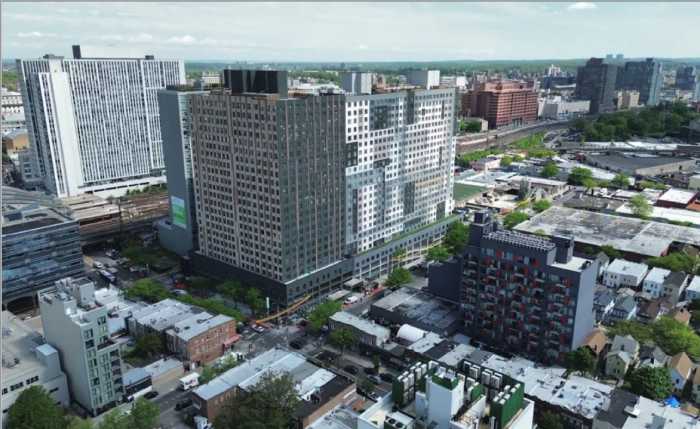By Joe Anuta
Opponents of the Willets Point redevelopment project rallied last week in support of a federal bill that could put the brakes on the multibillion-dollar project, but opponents said the measure would economically cripple the city.
Shop and property owners affiliated with Willets Point United, a group opposed to the development, gathered at a gas station along Northern Boulevard last Thursday to urge U.S. Sens. Charles Schumer (D-N.Y.) and Kirsten Gillibrand (D-N.Y.) to vote in favor of the Private Property Rights Protection Act of 2012, which would penalize municipalities for using eminent domain to build what the bill calls “economic development projects.”
“This whole smelly process is a poster child for why eminent domain should not be used to deprive small business owners of their rights,” said Irene Prestigiacomo, a landlord who owns property in the Iron Triangle.
Prestigiacomo was joined by elected officials on both the city and state levels who blasted the city Economic Development Corp. for initiating eminent domain proceedings against property owners in Willets Point. Those efforts have been hampered by several lawsuits filed on behalf of Willets Point United, but the bill currently in the Senate could render all legal proceedings irrelevant, since it could derail the project altogether.
A spokesman for Gillibrand said the senator is considering the legislation, while Schumer’s camp did not respond to a request to comment.
The bill passed the U.S. House of Representatives Feb. 28, with what is known as a voice vote. It means whoever was on the House floor at the time votes on the bill, but those votes are not tallied and made available to the public.
Rep. Joseph Crowley (D-Jackson Heights) was not on the floor when the vote was taken, and a spokesman said Crowley does not support the bill in its current form.
Specifically, the act seeks to penalize government entities that exercise eminent domain for projects that are not overtly for public use. It defines “economic development” projects as commercial enterprise or any development designed to increase the tax base or employment.
It exempts a list of projects like hospitals or removing harmful materials, but the legislation was not without its critics.
The penalty comes in the form of withholding federal funds used for any economic development projects, a broad-reaching category that dissenting House members and a city attorney said would be disastrous to projects all around the city, not just Willets Point.
“If this bill were to become law, important revitalization projects, such as the ones that gave new life to Times Square, MetroTech and Lincoln Center, wouldn’t be possible and it would also jeopardize the long-sought redevelopment of Willets Point,” said Lisa Bova-Hiatt, deputy chief of the city Law Department.
The city would be forced to choose between using eminent domain to acquire property at Willets Point and losing Uncle Sam’s cash, or possibly abandoning the Willets Point project in order to keep federal funding, a spokeswoman from the department said.
Federal funds are not being used for the Willets Point project, but if the city were to use eminent domain to acquire properties there, and if that acquisition was deemed to violate the stipulations in the bill, it would lose federal funding for all projects for a period of two years.
In the dissenting opinions in the House, legislators charged that the bill would only penalize the city while not offering affected property owners any relief, although property owners can take the issue to court.
Reach reporter Joe Anuta by e-mail at januta@cnglocal.com or by phone at 718-260-4566.


































